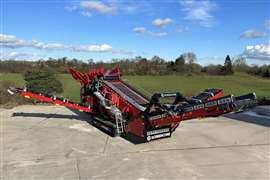Cut the red tape: How to stop contracts from killing your margins
18 August 2025
Demolition and recycling contractors are drowning in contracts built for the courtroom, not the jobsite. This article reveals why simplification isn’t just smart – it’s essential for protecting profit margins, avoiding disputes, and building trust on every job.
 Photo: Moopingz via AdobeStock
Photo: Moopingz via AdobeStock
Across the globe, contractors and consultants in demolition and recycling are drowning in paperwork.
Whether you’re quoting to crush concrete in Canada, dismantling steel in Singapore, or bidding for a project in Portugal, one thing is constant: contracts are more confusing than they need to be.
Worldwide there are hundreds – if not thousands – of standard, model or template contracts used in engineering, demolition and recycling.
They come from publishers, trade associations or professional bodies and companies themselves.
In theory, this is good news. Take the UK, for instance – a country that’s spent decades building an impressive library of more than 150 standard forms. Whatever the job – wrecking ball or robotic arm – there’s probably a contract to match.
Why standard construction contracts fail demolition contractors
But in practice? We’re left bewildered. These documents are sold like miracle cures by well-meaning institutions or online marketplaces. And just like snake oil, there’s rarely any real evidence that one is better than the next.
For many terms and conditions, the font size alone is a deterrent. And if you do manage to squint your way through, you’re rewarded with a sea of jargon, clunky structure, endless cross-referencing, and annexes that refer to more annexes. There are no diagrams, nor process maps, and very little help.
And when you finally get past the definitions (how many ways can we define ‘day’?), you’re left navigating fine print that feels designed to make you give up.
So, we do. We print the contract, sign it, file it away – and hope for the best. Our hypothetical flag of surrender is to shove them in a drawer or folder and hope that we never have to use it in anger.
Designed for courtrooms, not construction sites
The problem with all these documents is simple: they’re written to win legal battles, not to help people run projects. Most projects don’t end in legal disputes, yet we act as if they will.
We’ve over-lawyered these documents, overcorrecting for a rare risk and in doing so, we’ve overlooked the everyday needs of business.
That’s not just opinion. World Commerce and Contracting’s Purpose of a Contract 2024 found that just 39% of businesspeople think their contracts actually support business outcomes.
And the key culprit? You guessed it: length and complexity.
Why simplifying contracts helps businesses
At its core, the case for simpler contracting is simple: instead of wasting time, energy and legal fees wrestling with dense documents, we invest it to build stronger working relationships, and fix issues as they arise.
We shift our focus from ‘the legal’ to ‘the human’.
And when we do, we see results.
Across case studies shared by organisations like World Commerce & Contracting, businesses that simplify their contracts report faster negotiations, lower legal spend, fewer disputes, and better overall outcomes.
Shorter documents, simpler terms and clearer processes unlock better pricing, smoother projects and more trust on all sides.
There’s a ripple effect too: project teams communicate more easily. Contract managers actually use the contracts. And those dreaded post-project disputes? Far fewer of them.
 Photo: Photo: photo for everything/via AdobeStock
Photo: Photo: photo for everything/via AdobeStock
The industry’s own data backs this up. Take the Arcadis Global Disputes Surveys – year after year, they point to the same root causes of conflict: poor contract administration, misunderstandings about rights to payment or time, and simple failures to read or understand the contract in the first place.
These aren’t legal failures – they’re usability failures.
In demolition and recycling, where margins can be tight and risks high, poor contracting habits are costly.
‘Business as usual’ isn’t good enough. We underestimate the cost of the status quo – not just in money, but in missed opportunities, damaged relationships and projects that never even get off the ground.
Because let’s face it: most contracts provoke a negative emotional response… frustration, confusion, eye rolls... sometimes outright horror.
But it doesn’t have to be that way. If we want to build trust in business, we need to build different kinds of contracts – ones that create confidence, not dread. As Alan Siegel put it, ‘Simplicity is a means to building clarity, transparency and empathy.’
Simpler contracting helps us save time, cut costs, reduce disputes and deliver better results. And to get there, we need to simplify both the process and the content.
The problem with contract templates in demolition and recycling
Standard form contracts were supposed to make life easier – a way to clarify responsibilities, highlight risks, and help contractors price work fairly. In theory, they’d simplify both the content and the process.
In reality? It failed.
Over the years, the original intention has been buried under a mountain of competing templates. There’s now such a wide (and ever-changing) choice of forms that even seasoned professionals struggle to remember what the standard, unamended version says – let alone the tweaked one you’re actually handed.
For demolition and recycling contractors, that’s a serious headache. You often don’t get to choose the contract. You’re handed the client’s preferred version – or worse, a contract that’s been back-to-backed from whatever Frankenstein’s monster the main contractor signed upstream. That leaves you with limited leverage and unknown risks.
The growing reliance on letters of intent is another red flag. These letters – informal agreements that request works or services while promising a ‘proper’ contract later – are a sign that the contracting process is broken.
How demolition firms can negotiate better contract terms
No project should start without a written agreement that clearly sets out who’s doing what, for how much, and on what terms. Yet in the UK alone, over £30 billion (US$40.5 billion) of construction work begins each year without any contract at all.
What can you do about it?
- Ask for the intended contract terms early in the bidding process.
- Make sure you have enough time to read, price and – where needed – negotiate.
- Push for terms that are clear, specific and actually reflect the project.
- And above all: don’t be bullied into signing a contract you don’t understand just to win the work. That’s not a shortcut — it’s a gamble. And in this game, your business is what’s at stake.
Contracts should be business tools, not legal traps
As World Commerce and Contracting’s ROI of Contracting 2023 put it: ‘Simplification matters because contracts contain critical information and data – yet some 90% of businesspeople find them difficult or impossible to understand.’
Demolition projects may be technically complex, but that’s no excuse for legal complexity. Complicated contracts assume not only that legal terms can’t be explained simply, but also that everyone in the supply chain has a lawyer on speed dial to interpret them.
That’s rarely the case.
Key elements of a good demolition contract
Contracts are business tools. They should reflect how the parties want to work together on this project. That means being clear about scope, goals, and risks – without drowning in detail.
In demolition, that might mean:
- Defining what a “clean site” really means
- Flagging risks both above and below ground
- Considering impacts on neighbours
- Limiting liability
- Being clear about how and when you get paid
- Building in flexibility for changes, delays or early exits
But it’s not just about risk allocation… it’s about values. Your contract should reflect the way you do business: what you stand for, what success looks like, and how each party contributes to that success. It should speak with clarity, not hide behind legalese. A good contract gives confidence, not wriggle room.
Why AI won’t fix broken contract processes
Could you use AI to write your contract? Well, maybe. If you give it a detailed prompt, it might just produce something… passable. But since it’s trained on traditional contracts – the kind we’re trying to improve – you’ll likely end up with a digital version of the same problems.
More importantly, contracts are about relationships. Unless your tool knows your business, your client, your scope, and the risks on this site and understands the quirks of local laws, it can’t give you what you really need.
I’m not against using AI. But let’s get the order right: simplify, then optimise, then digitise. Otherwise, all we’re doing is creating digital rubbish.
This series will dig deeper into each of the issues we’ve touched on, so you can do better deals with less drama. Got a question or a topic you want covered? Drop us a line.
COMING SOON: What ‘quality’ really means in demolition contracts
In her next D&Ri article, Sarah Fox explores why quality myst be defined by project outcomes, not generic legal standards - and how demolition contractors can protect themselves.

About the authorBased in the UK, Sarah Fox is a contract expert with over 30 years’ experience in the construction and engineering sectors. A former lawyer, she works with both UK and international clients and is an associate lecturer at the University of Salford. Sarah specialises in creating concise, user-friendly contracts that promote clarity and reduce disputes. She is also the author of several books on construction law, including the ground-breaking industry title Small Works Contracts in Just 500 Words. |
CONNECT WITH THE TEAM









